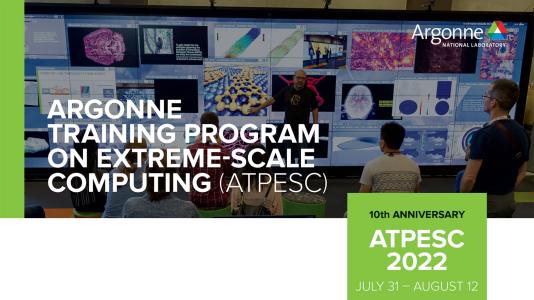
The program offers early career computational scientists two weeks of in-depth instruction on high-performance computing.
In this year’s program, held July 31 to August 12, 2022, MCS division staff gave numerous presentations and led hands-on sessions on key skills and tools for designing, implementing and executing applications on high-end computing systems.
Following is a list of the activities MCS researchers participated in at this year’s training program. For the full ATPESC 2022 agenda, see the website: https://extremecomputingtraining.anl.gov/agenda-2022/.
Track 2 B – Programming Models and Languages – MPI
- Derived datatypes and RMA -- Ken Raffenetti
- Hybrid programming with threads and GPUs and what’s new in MPI-4 – Yanfei Guo
Track 3 – I/O
- Introduction; principles of HPC – Phil Carns
- Darshan introduction; understanding and tuning performance – Shane Snyder
- MPI/IO and Parallel netCDF – Rob Latham
Track 5 – Numerical Algorithms and Software for Extreme-Scale Science
- Nonlinear solvers (with PETSc) – Richard Tran Mills
- Optimization (with TAO) – Todd Munson
- Panel Discussion: Extreme-scale numerical algorithms and software
- Moderator – Richard Tran Mills; panelist – Todd Munson
Track 7 – Software Productivity and Sustainability
- Scientific software design – Anshu Dubey
- Lab notebooks for computational mathematics, sciences, and engineering – Jared O’Neal
- Managing computational experiments – Anshu Dubey and Jared O’Neal
Track 8 – Machine Learning
- Deep learning methods – Tanwi Mallick
- Scientific machine learning for dynamical systems – Romit Maulik